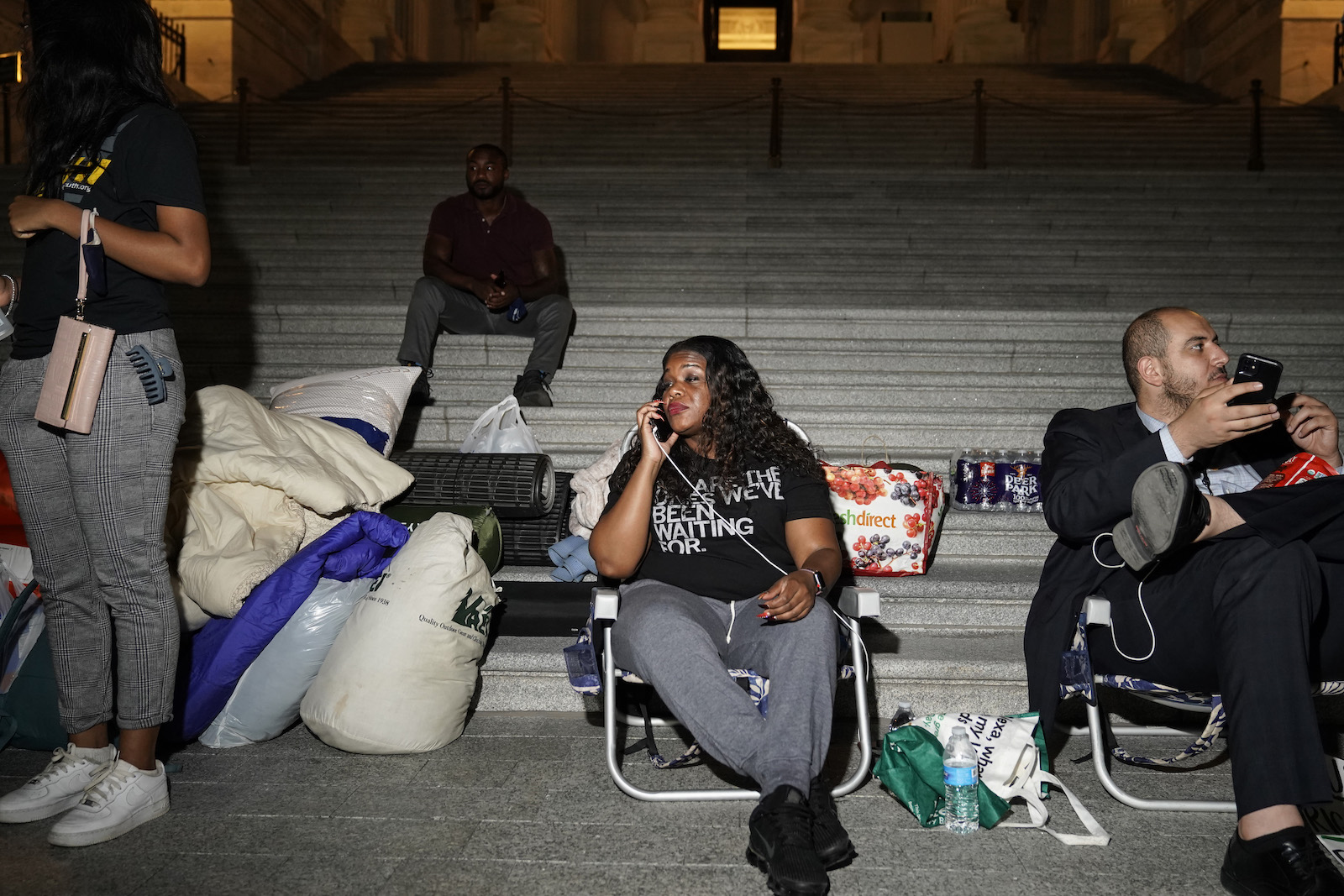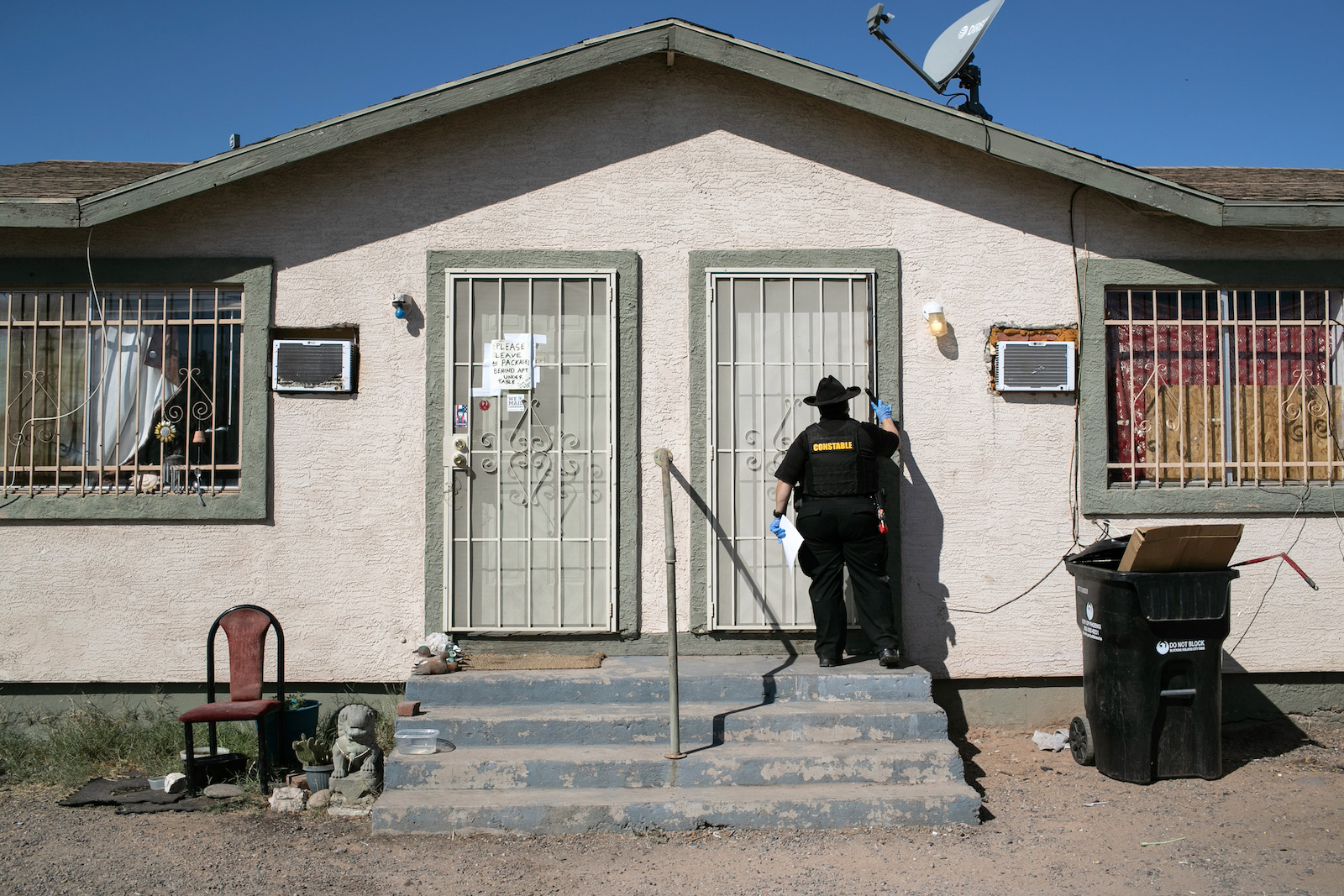Cori Bush knows the violence that can stem from homelessness — and how it so often begins with eviction. Local surveys have found that anywhere from 12 percent to nearly half of people living on the streets blame eviction for their homelessness. Bush, who is now a Democratic U.S. Representative of Missouri, lived in a Ford Explorer with her then-husband and two young children for three months after the family was evicted in 2001.
She sees the right to housing as a central tenet of environmental justice. Homelessness and housing insecurity, she has argued, hinders families’ abilities to access the resources — clean water, fresh food, and heating and cooling — needed to survive. The past year has been particularly deadly for those without housing, as unrelenting heat waves, poor COVID-19 precautions, and unhealthy air-quality levels exacerbated by wildfires and pollution have made living on the streets even more dangerous. At the same time, cities across the country have moved to criminalize housing encampments and limit the rights of the unhoused.
“I don’t want anyone else to have to go through what I went through, ever,” Bush told the Associated Press. So when the White House last week said they could not extend the federal eviction moratorium — which has prohibited evictions since March 2020 to curb the spread of COVID-19 — eventually letting it expire, she took the fight into her own hands. The Center on Budget and Policy Priorities estimated that 11.4 million adult renters were on the verge of eviction.
For four nights, Bush slept outside the U.S. Capitol, demanding that President Joe Biden extend the moratorium. Ultimately, she and her congressional allies won. On Tuesday, the Centers for Disease Control and Prevention, or CDC, issued a new eviction moratorium that will last until October 3. The new moratorium will temporarily halt evictions in counties with “substantial and high levels” of COVID-19 transmission, a stipulation that will reportedly cover areas where 90 percent of the U.S. population lives. The CDC’s new moratorium comes after the Biden administration claimed it didn’t have the authority to extend the eviction ban — and after some localities already began resuming evictions. (Despite the moratorium, waning state protections and inadequate legal services have led to at least 450,000 evictions taking place during the pandemic, according to Princeton University’s Eviction Lab.)

In a column for Time last week, Bush denounced the “consequences of our government’s failure to secure the basic necessities people need to survive.” That same day she introduced an “Unhoused Bill of Rights,” which calls on Congress to permanently end U.S. homelessness by 2025 by investing in affordable housing, universal housing vouchers, and social services targeted at people most likely to be living on the street.
While many environmental activists, including the Sunrise Movement, have characterized the new moratorium as a climate justice victory, Bush and other housing advocates argue that the protection is one among many that need to be instituted to ensure housing and environmental justice for America’s most vulnerable.
Julian Gonzalez, a water policy lobbyist with the nonprofit group Earthjustice, says that issues like utility unaffordability constitute another front in the fight to ensure housing security. (Disclosure: Earthjustice is an advertiser with Grist.)
“Utility affordability, particularly water affordability, is a big part of the housing crisis and environmental justice,” Gonzalez told Grist. “Eventually the eviction moratorium is going to get lifted and folks are going to be saddled with bills, and they’re going to get their water and electricity shut off — with that comes displacement and eviction.”
This is especially important, according to Gonzalez, because while there are state-based and national programs to provide assistance for energy bills, there are none for water. Across the country, households are facing billions of dollars worth of utility debt and hundreds of thousands of homes are experiencing utility shutoffs. Earthjustice and other organizations across the country are calling for the inclusion of water and utility assistance programs in Congress’ upcoming infrastructure bill, which in its current iteration only includes a 40-city rural and low-income water assistance pilot program with no authorized funding.
Courtney McKinney, director of communications at the nonprofit Western Center on Law and Poverty, says the U.S. should create a system that permanently limits the prevalence of evictions. The center is working on building state-based legal assistance funds, dubbed “homelessness prevention funds.” Across the country, just 10 percent of renters who go through an eviction process have legal representation, compared to 90 percent of landlords.
Eviction creates a never-ending cycle of subpar housing, McKinney argues. According to Princeton’s Eviction Lab, 70 percent of evicted tenants go on to experience serious quality of life issues in the next home they move into.
“All across the country, the climate is making this more of a dire situation,” McKinney told Grist. “In the West, in particular, climate change, poor housing, and homelessness is making for a deadly reality moving forward.”



